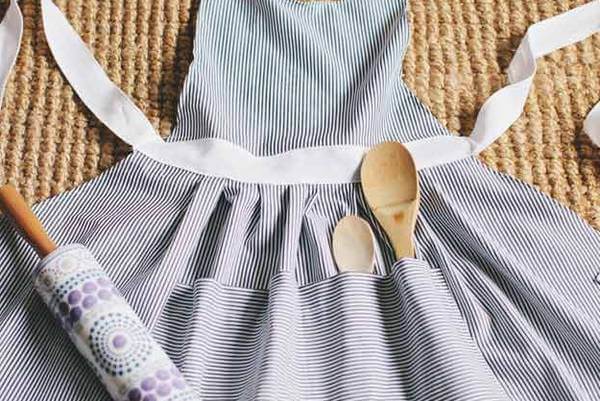Aprons are an essential element of the uniform for most food service workers. Aprons are a necessary uniform item for anybody working in the food service industry. Additionally, they contribute to maintaining safe practices in the food industry. We break down the many apron styles and their applications so that you may choose one that works best for your restaurant.
Types of Aprons
Learn about the several uses for aprons so you can stock your company with the appropriate varieties.
- Server Aprons and Waist Aprons
Server and waist aprons cannot be used in the kitchen since they only cover the lower half of the body. However, the lower length makes them more practical for servers who must wander about your building. Most waitstaff aprons contain pockets where small items like pencils, guest checks, and straws may be kept.
Server Apron Applications:
- Front-of-house servers
- Bussers
- Head waitresses or waiters
If your business needs aprons, you can order them at McDonald Paper Supplies and you can also have them branded. Order online or visit an offline store in Brooklyn.
- Four-Way Aprons
4-way waist aprons are ideal for personnel who need to wear them numerous times before cleaning them, as their name implies they feature four layers. The user may change the top layer if it becomes soiled. Because your crew won’t need to change aprons as often, you’ll save money on laundry.
Four-Way Apron Applications:
- Chefs
- Back-of-house kitchen staff
- Bistro Apron
Bistro aprons, like waist aprons and 4-way aprons, do not protect the upper body. The extended length of a bistro apron sets it apart from other styles and helps keep your trousers clean. They work well for washing down tables and other similarly dirty tasks. The wait staff may keep things like guest checks, pencils, and straws organized in the pockets of their bistro aprons.
Bistro Apron Applications:
- Front-of-house staff
- Bib Apron
This classic apron design has a loop at the back of the neck and ties at the waist. The pockets on most bib aprons are designed to hold items like order pads, guest checks, thermometers, and other small yet useful tools. Full-body protection against spills and splashback is provided by bib aprons, often known as chef aprons, making them one of the finest aprons for kitchen personnel.
Bib Apron Applications:
- Kitchen Staff
- Servers
- Butchers
- Tuxedo Aprons
Tuxedo aprons are an elegant alternative to the more common bib apron and are often worn by wait staff at high-end restaurants, banquet halls, and during catered events. They work well for hostesses and hosts of banquets and other catered events. For a neat and tidy look in the food service industry, tuxedo aprons are best worn with a white button-down shirt and a bow tie.
Tuxedo Apron Applications:
- Waiters at fine dining establishments
- Catering staff
- Buffet line staff
- Aprons for Cobblers
Cobbler aprons, which cover the front and back, are often referred to as smock aprons. The apron may be tied loosely or tightly at the side. The only downside is that they only reach around midthigh on most people, even though they do a superb job of keeping workers’ undershirts clean. Smock aprons find widespread usage in kitchens, classrooms, hospitals, and hotels because of their adaptability and convenience.
Cobbler Apron Applications:
- Bakers
- School cafeteria workers
- Hospital staff
- Housekeeping staff
- Dishwasher Apron
Dishwasher aprons are worn by dishwashers to protect their clothing from becoming wet when washing many dishes at a restaurant, hotel, cafeteria, or assisted living complex. Full-length, above-the-knee versions of these waterproof aprons are available. Dishwasher aprons may be found with special features like these. Working at a three-basin sink or loading a dishwasher exposes workers to chemicals, grease, and chemical residues that may damage clothes and skin.
Dishwasher Apron Applications:
- Dish room staff
- Aprons, Disposable
These disposable aprons are non-porous and waterproof, making them ideal for use by dishwashers and bussers when cleaning tables. Polyethylene or polypropylene aprons are water-resistant and disposable. To avoid pathogen transmission, disposable aprons are needed when handling raw meat and seafood, deli foods, and strong chemicals.
Disposable Apron Applications:
- Deli staff
- Cleaning staff
- Bussers
- Dishwashers
Aprons’ Advantages
Aprons are required clothing for all wait staff in restaurants. Aprons in the food industry:
- Keep your front- and back-of-house clean.
- Choose a single hue for cohesion in the kitchen, or mix and match hues to designate individual cooks.
- Food service workers are more likely to avoid soiling their uniforms.
- During a shift, a dirty apron may be easily replaced. Aprons are useful and cost-effective.
- The long drawstrings allow for a customized fit for persons of varying heights and weights.
Aprons: A Brief History
The Medieval French word naperon, meaning “small tablecloth,” is the progenitor of the English word apron. “An apron” was a regular naperon mispronunciation. The 17th century called protective overgarments aprons. The name “apron” didn’t occur until the 17th century, although protective clothing has been utilized since ancient times. Egyptian pharaohs, Assyrian priests, and Minoan fertility goddesses wore aprons.
